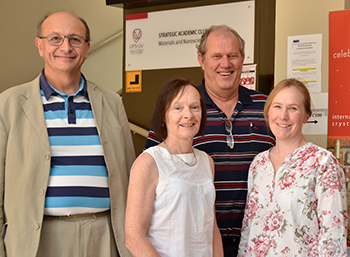Latest News Archive
Please select Category, Year, and then Month to display items
19 November 2018
|
Story Charlene Stanley
|
Photo Charlene Stanley
 Prof John Mubangizi, Dean of the Faculty of Law, encouraged delegates at the Fifth Annual International Mercantile Conference to share ideas on best international practice in their various fields.
Prof John Mubangizi, Dean of the Faculty of Law, encouraged delegates at the Fifth Annual International Mercantile Conference to share ideas on best international practice in their various fields.
“Don’t say anything online that you wouldn’t want plastered on a billboard with your face on it.”
This famous quote by international tech expert Erin Bury should be a guiding light when it comes to online habits in the workplace, according to Francois Cilliers, UFS Lecturer in Mercantile Law.
In his presentation Could Social Media be the Gateway to Employment Discrimination? he warned that employees have a responsibility not to bring their employers in disrepute through their comments on social media.
“Posts, updates, tweets, and comments are considered to be publications and can therefore never be seen as privileged information,” he explained.
Responsibility on employees and employers alike
He pointed out that employers also had a responsibility regarding the way in which they use the information about prospective employees obtained via social media.
“Nowadays, approximately 75% of companies hire through social media. In the US, recruiting companies spend hours researching candidates, making full use of what they can find on social media. It was found that 50–80% of employers frowned upon posts and pictures featuring drug and alcohol abuse, profanity, and bad grammar.”
He warned that employers needed to tread lightly, as a decision not to employ someone as a result of information on the prospective employee’s political views and sexual orientation could constitute unfair discrimination as set out in the Employment Equity Act.
“An employer who wishes to use a screening process (utilising social media) has to prove that the information and the process is objectively necessary and can be justified with reference to the inherent requirements of the job,” he explained.
“As technology and electronic systems advance, so too should the applicable labour laws.”
Cilliers’ presentation formed part of the Fifth Annual International Mercantile Law Conference recently hosted by the Faculty of Law on the Bloemfontein Campus.
Incorporating new technology in teaching and research
“This conference is an opportunity to share ideas on best practice in what is perceived as a ‘difficult’ field within Law,” said Prof John Mubangizi, Dean of the Faculty of Law, as he opened the proceedings. Topics in the discussion sessions ranged from Racism in the workplace and The underrepresentation of females in the judiciary, to Decriminalisation of cannabis: A recipe for healthy employer-employee relations?
“Conferences such as these help us to take advantage of the newest developments in technology to advance our teaching and research,” said Prof Mubangizi.
“To quote Einstein: ‘We can’t solve problems by using the same kind of thinking we used when we created them.’”
Prestige Scholar hosts Prof John Helliwell of Manchester University
2015-12-08

From left is Prof John R. Helliwell (School of Chemistry, University of Manchester), Dr Madeleine Helliwell (School of Chemistry, University of Manchester), Prof Andre Roodt (Department of Chemistry, University of the Free State) and Dr Alice Brink (Department of Chemistry, University of the Free State).
Photo: Steven Collett |
At the invitation of Dr Alice Brink of the Department of Chemistry, Prof John Helliwell, the 2015 Max Perutz Prize winner, and his wife, Dr Madeleine Helliwell, visited the University of the Free State (UFS).
The Helliwells, both chemists of note, took part in a series of lectures and exchanges on the Bloemfontein and Qwaqwa Campuses.
This visit from 9-19 November 2015 was the consequence of Dr Brink’s participation in the Vice-Chancellor’s Prestige Scholars Programme (PSP) initiative to encourage the broadening of the international footprint of the next generation of scholars in the academy.
Two year collaboration
Dr Brink and Prof Helliwell from Manchester University have a standing collaboration going back two years. Dr Brink, an NRF Thuthuka grant holder and a member of the PSP since 2013, has spent almost eight months in Manchester, collaborating with Prof Helliwell on her study of the successful interaction of rhenium tricarbonyl complexes with proteins determined via protein crystallography.
Their collaboration resulted from the close association of Prof Helliwell and Prof Andre Roodt from the UFS Department of Chemistry, both former presidents of the European Crystallographic Association.
Sharing academic expertise
Prof Helliwell, the 2014 American Crystallographic Association Patterson Award winner for his “pioneering contributions to the global development of the instrumentation, methods and applications of synchrotron radiation in macromolecular crystallography”, gave three lectures in the Department of Chemistry, two on the Boemfontein Campus, and the other on the Qwaqwa Campus on 13 November 2015.
Dr Helliwell, former co-editor of the Acta Crystallographica Section C: Crystal Structure Communications journal, consulted with postgraduate students from the Departments of Chemistry and Biochemistry.